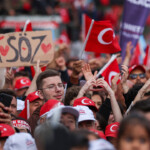Assessing the pros and cons of Turkey’s upcoming elections and predicting their outcome remains an arduous task till the very end. What if Erdoğan wins again? Will Kemal Kılıçdaroğlu become the first leader of the main opposition Republican People’s Party (CHP) to lead a government in Turkey since Bülent Ecevit? And, if that happens, how will Recep Tayyip Erdogan react? How will he manage an election loss, especially if it’s marginal? Is the economy a ticking bomb? What is the best, and the worst, possible scenario?
These questions are preoccupying those who are closely following the historical turning point that Turkey seems to be reaching, with the first round of voting next Sunday.
Predictions are even more uncertain about how the ballot results will effect Ankara’s foreign policy. Erdoğan’s main opponent in this election is the economic crisis and the burdens it has brought upon the average Turkish citizen.
One of Greece’s leading newspapers, Kathimerini, asked experienced analysts to summarize their views on what awaits Turkey, its neighbors, and the world in general as we wait to see the what happens.
FTP will be reprinting them in parts until election day.
***
Prof Ahmet Insel: ‘Changes more of style Than of substance’
The victory of the opposition “will not completely overturn Turkey’s foreign policy,” according to Ahmet Insel, a Turkish publicist, academic and author of the book Erdoğan’s New Turkey. Against Cyprus and Greece, in particular, the changes will be more of style than substance.
Regarding Cyprus, “the complete annexation of the north of the island will no longer be on the agenda, but the ‘frozen conflict’ will continue. The government could encourage the Turkish Cypriots to engage more in dialogue with the Greek-Cypriot side – if of course this is also the desire of the government in Nicosia. With Greece, the confrontation will continue, but there will not be this permanent tension, these threats that ‘we will suddenly come in the night’ that Erdogan has been issuing lately. But should the opposition win, the government will still be nationalist, no more and no less than previous ones – though perhaps more open to dialogue. Above all, foreign policy will not depend on a single man and his moods.”
“The problems of the region will not change after the elections,” continues Insel. “Probably there will be some normalization in relations with EU and NATO, there will be the green light for Sweden to join [NATO], the deactivation of the S-400 missiles, perhaps a return to the F-35 fighter jet program (if it is not too late) and the resumption of accession negotiations with the EU.”
As for Russia, “there will probably be a little distancing, some mutual mistrust, but Turkey will probably continue its role as a mediator” between the two warring sides. “Already, under the threat of US sanctions, the Erdogan government suspended the transit of products destined for Russia from Turkey a month ago.” In Syria and Libya “the current policy is likely to continue. Turkey’s ambition to be a regional power will remain in place.”
Prof Insel foresees more significant changes inside Turkey if Kemal Kılıçdaroğlu is elected. “The joint program of the Nation Alliance [the opposition coalition] foresees substantial reforms regarding the freedom of the press, the independence of the judiciary and the restoration of the rule of law. Especially since the Alliance will likely not have a majority in parliament, the parliamentary group of the coalition of the Left, which includes the pro-Kurdish HDP party, will be able to negotiate bolder reforms on these issues. A wind of freedom is sure to blow in the wake of the election if Erdogan loses. After all, Kılıçdaroğlu promised to immediately implement the decisions of the European Court of Human Rights.”
If, on the other hand, Erdoğan is re-elected, “it will be difficult to change course,” according to Insel. “He formed a far-right alliance, with ultra-nationalist and extreme Islamist parties. Political rationality dictates that he change his foreign policy strategy to overcome the enormous economic difficulties he will face. Some commentators predicted the same after the 2018 elections, but Erdoğan continued unabated on his authoritarian, Islamist course and further distanced himself from Western countries. To change course, he would have to be able to find new allies among the parties of the opposition. However, the hatred against Erdogan is strong and deeply rooted in that side of society.”
Domestically, Erdoğan’s re-election will signal the “consolidation of an authoritarian political system in Turkey, the institutionalization of a quasi-dictatorial regime. Getting out of something like this will be much harder five years later – the hopes of it happening through an election will fade. Turkey’s future will be very chaotic. After the failure of the united opposition in Hungary, it will also be very bad news for the future of democracy internationally against the ethno-populists,” he concludes.
***
Prof Ahmet Insel: ‘Changes More of Style Than of Substance’
The victory of the opposition “will not completely overturn Turkey’s foreign policy,” according to Ahmet Insel, a Turkish publicist, academic and author of the book Erdoğan’s New Turkey. Against Cyprus and Greece, in particular, the changes will be more of style than substance.
Regarding Cyprus, “the complete annexation of the north of the island will no longer be on the agenda, but the ‘frozen conflict’ will continue. The government could encourage the Turkish Cypriots to engage more in dialogue with the Greek-Cypriot side – if of course this is also the desire of the government in Nicosia. With Greece, the confrontation will continue, but there will not be this permanent tension, these threats that ‘we will suddenly come in the night’ that Erdogan has been issuing lately. But should the opposition win, the government will still be nationalist, no more and no less than previous ones – though perhaps more open to dialogue. Above all, foreign policy will not depend on a single man and his moods.”
“The problems of the region will not change after the elections,” continues Insel. “Probably there will be some normalization in relations with EU and NATO, there will be the green light for Sweden to join [NATO], the deactivation of the S-400 missiles, perhaps a return to the F-35 fighter jet program (if it is not too late) and the resumption of accession negotiations with the EU.”
As for Russia, “there will probably be a little distancing, some mutual mistrust, but Turkey will probably continue its role as a mediator” between the two warring sides. “Already, under the threat of US sanctions, the Erdogan government suspended the transit of products destined for Russia from Turkey a month ago.” In Syria and Libya “the current policy is likely to continue. Turkey’s ambition to be a regional power will remain in place.”
Prof Insel foresees more significant changes inside Turkey if Kemal Kılıçdaroğlu is elected. “The joint program of the Nation Alliance [the opposition coalition] foresees substantial reforms regarding the freedom of the press, the independence of the judiciary and the restoration of the rule of law. Especially since the Alliance will likely not have a majority in parliament, the parliamentary group of the coalition of the Left, which includes the pro-Kurdish HDP party, will be able to negotiate bolder reforms on these issues. A wind of freedom is sure to blow in the wake of the election if Erdogan loses. After all, Kılıçdaroğlu promised to immediately implement the decisions of the European Court of Human Rights.”
If, on the other hand, Erdoğan is re-elected, “it will be difficult to change course,” according to Insel. “He formed a far-right alliance, with ultra-nationalist and extreme Islamist parties. Political rationality dictates that he change his foreign policy strategy to overcome the enormous economic difficulties he will face. Some commentators predicted the same after the 2018 elections, but Erdoğan continued unabated on his authoritarian, Islamist course and further distanced himself from Western countries. To change course, he would have to be able to find new allies among the parties of the opposition. However, the hatred against Erdogan is strong and deeply rooted in that side of society.”
Domestically, Erdoğan’s re-election will signal the “consolidation of an authoritarian political system in Turkey, the institutionalization of a quasi-dictatorial regime. Getting out of something like this will be much harder five years later – the hopes of it happening through an election will fade. Turkey’s future will be very chaotic. After the failure of the united opposition in Hungary, it will also be very bad news for the future of democracy internationally against the ethno-populists,” he concludes.
***
Prof Murat Somer – ‘Allied opposition will more likely be the winner’
Professor of political science and international relations at Koc University, in Istanbul, Prof Murat Somer writes:
“The good scenario is that the voters vote as a block for democracy. And the opposition wins both presidential and parliamentary elections by wide margins so that the government and the state institutions it has politicized cannot spin facts and deny the results even if they want to.
For similar reasons, it would be best for the winner to be clear in the first round of the presidential election. And the opposition winning both the presidency and parliamentary majority would mean that they can implement the legal-institutional reforms they agreed on to rebuild democracy, and sound policies of economic recovery.
The bad scenario is that opposition votes divide their votes between candidates and the government wins the presidency, legislature or both. The government simply no longer have the program and the political will to democratize and recover the economy. Perhaps an even worse scenario is if the government loses the elections and denies the results, leading to severe sociopolitical conflict.
I am working on the assumption that Greek-Turkish relations can be improved sustainably with stable governments’ fully committed democratic ideals, including peaceful resolution of all conflicts and disagreements. Authoritarian governments can only lead to temporary improvements in transactional terms. So the good scenario for Turkey is also best for Greek-Turkish relations.
This is the first time since June 2015, if not 2002, that Turkey is approaching elections with the allied opposition being the more likely winner. Thus, the first and good scenario coming true is quite high. But the upcoming weeks will be critical as there still are many undecided voters and voters uneasy with their decision.
And the election day and the “day after” will be ciritical as various government actors show many signs, as expected, that they are not ready to accept and digest the popular will if it does not favor them.
The Interior Minister resembled the opposition’s electoral campaign to a coup attempt. This twisted fear of “they want to ‘overthrow’ us” through elections!” has long been present in the AKP, as I wrote about it in 2014, but it becomes more vocalized whenever the party faces a real chance of losing.
This is a shortened version of an article published by Kathemerini. To read the original, click here.
The views and opinions expressed above are the authors’ and do not represent those of the Free Turkish Press.


